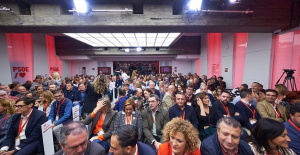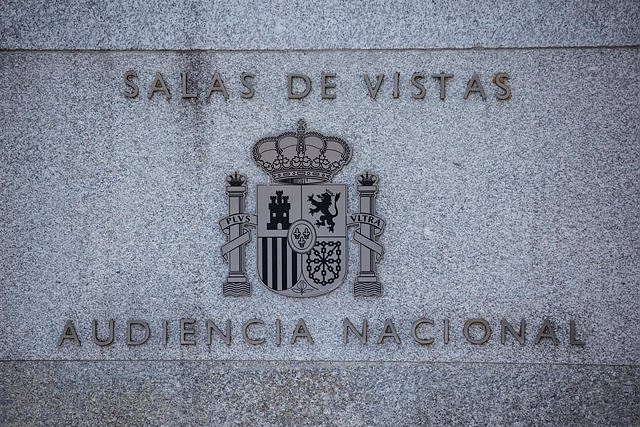MADRID, 16 Ene. (EUROPA PRESS) -
The Criminal Chamber of the National Court (AN) has confirmed the prosecution of Duro Felguera, its former president Juan Carlos Torres and the former Venezuelan vice ministers Nervis Villalobos and Javier Alvarado for alleged bribes for the construction of a thermoelectric plant in the Caribbean country.
In an order, to which Europa Press has had access, the Criminal Chamber rejects the appeals made against the decision of Judge Ismael Moreno to place a total of twelve people and four companies one step away from the bench, thus accessing as requested by the Anti-Corruption Prosecutor's Office.
The challenge alleged that, "despite the extensive account of events by the Public Prosecutor's Office" assumed by the head of the Central Investigative Court Number 2, "there is no fact that reflects international corruption."
In his opinion, the judicial resolution did not indicate "what the attempt to corrupt would have been, which authorities or officials would have been corrupted, and how they would have been corrupted, to act or to abstain in relation to the exercise of their functions, functions that were also not specify or clarify."
"There is no source of evidence that the awarding of the Termocentro project to Duro Felguera was due to corruption or any kind of gift," said those investigated in the case.
However, the Criminal Court, in a presentation by Judge Joaquín Delgado, endorses Moreno's decision because his order specifies how those investigated, "in their capacity as those responsible for Duro Felguera," "decided to deliver various amounts of money ( up to, at least, a total of 105,627,600 dollars)" to Venezuelan officials through "intermediate companies" so that they could use "their capacity to influence" for the benefit of the Asturian company.
"And it explains that, with the objective of channeling all these payments, the people investigated created a corporate structure through which bank transfers were made; and thus their bribe was sent to each official investigated from January 2009 until, at least , March 2013," he adds.
Among the defendants are, in addition to Torres, Villalobos and Alvarado, the wives of the former Venezuelan vice ministers, María Consuelo Pardí and Milagros Coromoto Torres, and the former CEO of Duro Felguera Ángel Antonio del Valle.
At the same time, the instructor ordered the provisional file regarding two people who participated in that Duro Felguera project, as he previously did with five other collaborators.
Regarding them, he pointed out that, although "the incriminating elements have been sufficient for the purposes of the investigation", they are not sufficient to go beyond this investigation phase.
"The actions of these people, being condescending to some irregular (illegal) practice of their company, do not reach criminal relevance because, firstly, they did not know the true context of their actions and omissions and, secondly, they lacked power of direction and decision," said the judge.
Regarding the dozen of those investigated, Moreno pointed out alleged crimes of international corruption, falsification of commercial documents and money laundering for events that date back to 2009 when there was "a major energy crisis in Venezuela" that led to restrictions and a declaration of " electrical emergency".
The judge reported that, "as one of the solutions to alleviate this emergency, the Venezuelan administration decided to build the 'Planta El Sitio' thermoelectric plant, in Santa Lucía (state of Miranda)" with the objective of supplying the Great Caracas, with 4.5 million inhabitants.
"For the award of this work, the then Minister of Electrical Energy, Rafael Ramírez, managed to appoint the Spanish company Duro Felguera" and "this, in exchange, undertook to make several deliveries of money to Venezuelan public officials who determined said award," he stated.
Moreno explained that, for the construction of the plant, Duro Felguera acted as UTE Termocentro, which signed "a series of contracts with Venezuelan entities and individuals that were intended to conceal the payment of commissions or bribes to Venezuelan public officials, so that they would benefit. the interests of said business".
Specifically, he specified that at least 105 million dollars were paid to Villalobos through "intermediate companies" so that "he could use his ability to influence the Venezuelan administration for the benefit of that company."
The magistrate maintained that it was this "favorable treatment" obtained through alleged bribes that allowed Duro Felguera to obtain the contract for the execution of the Termocentro project, valued at 1.5 billion dollars.

 Exploring Cardano: Inner Workings and Advantages of this Cryptocurrency
Exploring Cardano: Inner Workings and Advantages of this Cryptocurrency Seville.- Economy.- Innova.- STSA inaugurates its new painting and sealing hangar in San Pablo, for 18 million
Seville.- Economy.- Innova.- STSA inaugurates its new painting and sealing hangar in San Pablo, for 18 million Innova.- More than 300 volunteers join the Andalucía Compromiso Digital network in one month to facilitate access to ICT
Innova.- More than 300 volunteers join the Andalucía Compromiso Digital network in one month to facilitate access to ICT Innova.-AMP.- Ayesa acquires 51% of Sadiel, which will create new technological engineering products and expand markets
Innova.-AMP.- Ayesa acquires 51% of Sadiel, which will create new technological engineering products and expand markets STATEMENT: ELFBAR and LOST MARY reveal progress in the fight against illicit vapers (1)
STATEMENT: ELFBAR and LOST MARY reveal progress in the fight against illicit vapers (1) STATEMENT: ELFBAR and LOST MARY reveal progress in the fight against illicit vapers (2)
STATEMENT: ELFBAR and LOST MARY reveal progress in the fight against illicit vapers (2) The PSOE is holding a Federal Committee this Saturday that will serve to close ranks with Sánchez so that he does not resign
The PSOE is holding a Federal Committee this Saturday that will serve to close ranks with Sánchez so that he does not resign The Ibex 35 closes the week at its highest since 2015 and is already looking at 11,200
The Ibex 35 closes the week at its highest since 2015 and is already looking at 11,200 How Blockchain in being used to shape the future
How Blockchain in being used to shape the future Not just BTC and ETH: Here Are Some More Interesting Coins Worth Focusing on
Not just BTC and ETH: Here Are Some More Interesting Coins Worth Focusing on UPV students build a prototype of a wooden house to move to Equatorial Guinea
UPV students build a prototype of a wooden house to move to Equatorial Guinea The UA opens the call for the Impulso 2024 Awards for the best innovative business initiatives
The UA opens the call for the Impulso 2024 Awards for the best innovative business initiatives ALI, virtual assistant from Alicante, internationally recognized by the OECD
ALI, virtual assistant from Alicante, internationally recognized by the OECD Retrópolis brings the golden age of video games and computing to the UPV
Retrópolis brings the golden age of video games and computing to the UPV A million people demonstrate in France against Macron's pension reform
A million people demonstrate in France against Macron's pension reform Russia launches several missiles against "critical infrastructure" in the city of Zaporizhia
Russia launches several missiles against "critical infrastructure" in the city of Zaporizhia A "procession" remembers the dead of the Calabria shipwreck as bodies continue to wash up on the shore
A "procession" remembers the dead of the Calabria shipwreck as bodies continue to wash up on the shore Prison sentences handed down for three prominent Hong Kong pro-democracy activists
Prison sentences handed down for three prominent Hong Kong pro-democracy activists ETH continues to leave trading platforms, Ethereum balance on exchanges lowest in 3 years
ETH continues to leave trading platforms, Ethereum balance on exchanges lowest in 3 years Investors invest $450 million in Consensys, Ethereum incubator now valued at $7 billion
Investors invest $450 million in Consensys, Ethereum incubator now valued at $7 billion Alchemy Integrates Ethereum L2 Product Starknet to Enhance Web3 Scalability at a Price 100x Lower Than L1 Fees
Alchemy Integrates Ethereum L2 Product Starknet to Enhance Web3 Scalability at a Price 100x Lower Than L1 Fees Mining Report: Bitcoin's Electricity Consumption Declines by 25% in Q1 2022
Mining Report: Bitcoin's Electricity Consumption Declines by 25% in Q1 2022 Oil-to-Bitcoin Mining Firm Crusoe Energy Systems Raised $505 Million
Oil-to-Bitcoin Mining Firm Crusoe Energy Systems Raised $505 Million Microbt reveals the latest Bitcoin mining rigs -- Machines produce up to 126 TH/s with custom 5nm chip design
Microbt reveals the latest Bitcoin mining rigs -- Machines produce up to 126 TH/s with custom 5nm chip design Bitcoin's Mining Difficulty Hits a Lifetime High, With More Than 90% of BTC Supply Issued
Bitcoin's Mining Difficulty Hits a Lifetime High, With More Than 90% of BTC Supply Issued The Biggest Movers are Near, EOS, and RUNE during Friday's Selloff
The Biggest Movers are Near, EOS, and RUNE during Friday's Selloff Global Markets Spooked by a Hawkish Fed and Covid, Stocks and Crypto Gain After Musk Buys Twitter
Global Markets Spooked by a Hawkish Fed and Covid, Stocks and Crypto Gain After Musk Buys Twitter Bitso to offset carbon emissions from the Trading Platform's ERC20, ETH, and BTC Transactions
Bitso to offset carbon emissions from the Trading Platform's ERC20, ETH, and BTC Transactions Draftkings Announces 2022 College Hoops NFT Selection for March Madness
Draftkings Announces 2022 College Hoops NFT Selection for March Madness























